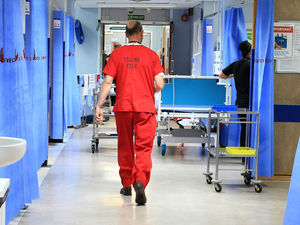Emergency pancreatic cancer highest to be diagnosed in the Black Country
Emergency pancreatic cancer presentations were the highest to be diagnosed in the Black Country last year.

New figures show that fewer cancer patients in the region received an emergency diagnosis but a charity boss said many people were waiting too long to start treatment.
NHS data shows that 1,319 patients were first seen as inpatients in the former NHS Black Country and West Birmingham Clinical Commissioning Group(CCG) from July to September last year.
Of those 297 or 22.5 per cent were emergency visits. An emergency presentation is when a diagnosis is given within 30 days of a hospital admission and does not include managed routes, such as cancer screening or through a GP surgery appointment.
The NHS said it was "encouraging" that emergency presentations have returned to below pre-pandemic levels.
The figures also show the cancers with the highest rate of emergency presentations were pancreatic cancer at 55.6 per cent, acute myeloid leukaemia which affects the white blood cells at 54.9 per cent and malignant central nervous system tumours at 51.5 per cent.
Cancer Research UK's policy director Dr Ian Walker said the overall fall in the proportion of people diagnosed through emergency routes was positive as those patients were tending to have worse outcomes. This was down from 24.9 per cent during the same period in 2021 and a fall from 26.3 per cent before the Covid-19 pandemic in 2019.
He also said too many people were waiting too long to receive a diagnosis and begin vital treatment.
Dr Walker said: "Despite the tireless work of NHS staff too many people affected by cancer are waiting too long to receive a diagnosis and begin vital treatment regardless of the route they enter the system.
"We urge the Government to show political leadership on cancer and use its upcoming Major Conditions Strategy to transform cancer services, so every patient has the best chances of early diagnosis and survival."
Across England 13,200 of the 71,600 presentations were emergencies, meaning the rate of emergency presentations was 18.4 per cent in the third quarter of 2022, down from 19.7 per cent the same period in 2021 and down from 19.3 per cent in 2019.
The Black Country Integrated Board has since been replaced the CCG and referred the Express & Star to the NHS reaction to the charity's comments.
The NHS stated: "It is encouraging news that emergency presentations of cancer are back below pre-pandemic levels, continuing the steady decline that we have seen over almost two decades.
"While the incidence rate has risen over time due to an ageing population, the hard work of NHS staff means the health service is now diagnosing a higher proportion of cancers at an early stage – when they’re usually easier to treat – than ever before, potentially saving thousands of lives."





